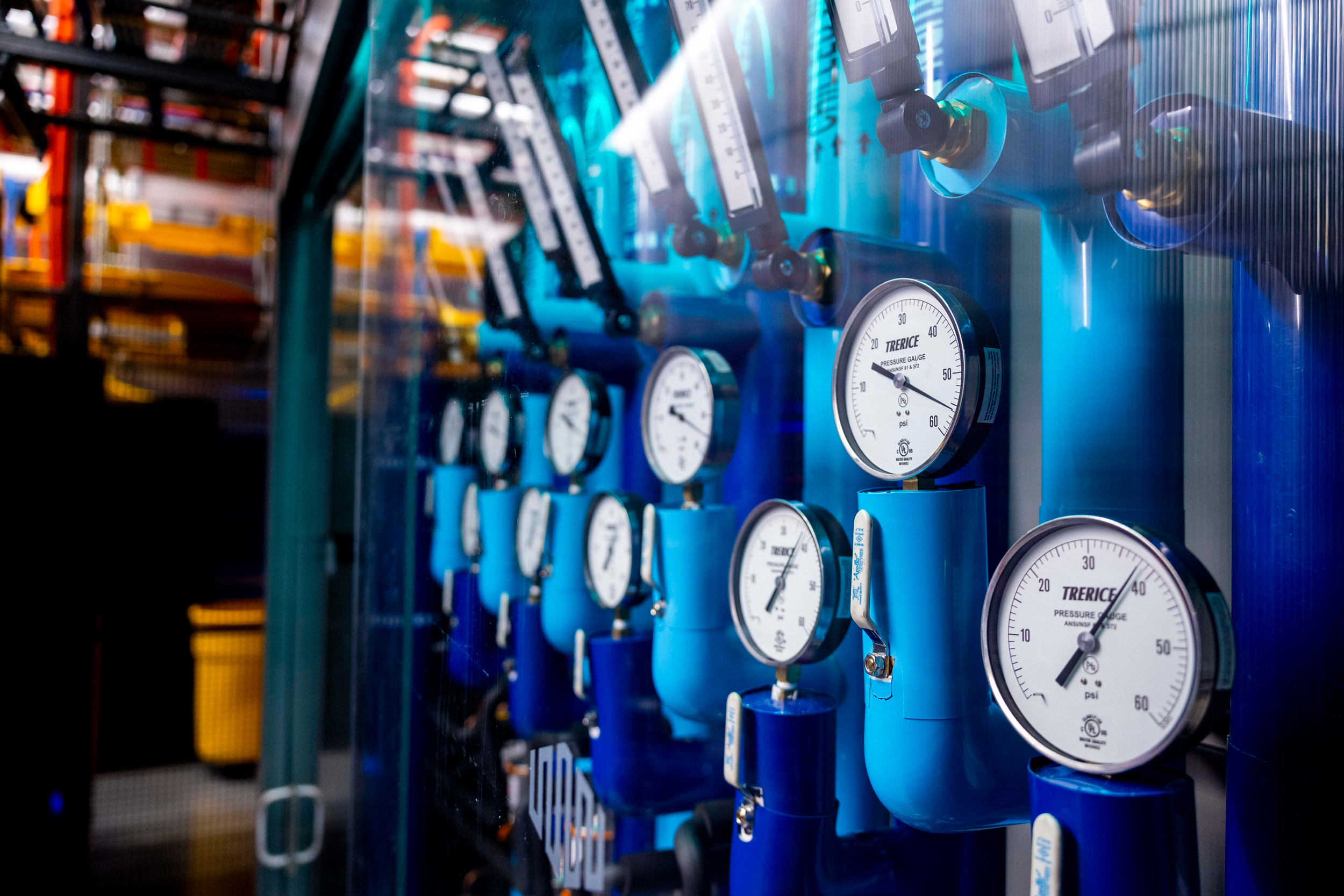A bill awaiting the signature of New Jersey Gov. Phil Murphy could reshape the relationship between the state and one of the fastest-growing industries amid the artificial intelligence boom: data centers.
The measure, Senate Bill 4293 and Assembly Bill 5548, would require operators to publicly disclose on a quarterly basis how much water and electricity they consume.
Supporters of the bill argue that data centers are unlike other industrial operations. They run around the clock, draw massive amounts of electricity to power servers and require millions of gallons of water to prevent overheating.
Those reports would then be made available to the public, giving lawmakers, regulators and local communities new insight into an industry that has often operated behind closed doors.
“AI has a tremendous impact on resources so this reporting should occur. You’re not talking about mom and pop here or even a normal office building or even a normal data center. They have huge impacts. So I think the reporting requirements are very reasonable,” said Bob Smith, a Democratic state senator from Middlesex and chair of the State Senate Environment and Energy Committee.
Lawmakers behind the bill said it is a necessary step to ensure that the facilities fueling artificial intelligence, cloud storage and e-commerce are not unfairly guzzling energy in New Jersey, a state that faced an electricity bill spike of about 20 percent over the summer.
But as the bill awaits action from Murphy, it faces pushback.
Business leaders, particularly from the state’s powerful trade groups, said the reporting requirements are unnecessary and potentially damaging to the state. The New Jersey Business & Industry Association (NJBIA), which represents companies across the state, has lobbied for Murphy to veto the bill.
Ray Cantor, NJBIA’s deputy chief government affairs officer, said that the legislation is “redundant,” given that businesses already have to comply with multiple environmental and utility regulations.
“New Jersey is very stringent on who they allow to take large quantities of water. So if they’re allowed to use water, it’s because the DEP has already reviewed their plans; to us, this is just an unnecessary and duplicative regulatory requirement,” Cantor said in an interview with Inside Climate News.
Under New Jersey rules, any facility that uses more than 100,000 gallons of water per day (or has the capacity to do so) for industrial, cooling or other non‐agricultural uses must obtain either a Water Allocation Permit or, if under that threshold, a Water Use Registration, from the Department of Environmental Protection. Commercial buildings over 25,000 square feet are required to benchmark and annually report their energy and water usage under the New Jersey Clean Energy Act.
Cantor warned that forcing data centers to reveal their utility consumption would amount to costs that could turn off developers from the Garden State.
“It may be a small cost, but small cost upon small cost add up. And when you have lots of regulations, you tend to generally discourage other businesses from locating in your state,” Cantor said.
The debate mirrored a broader balancing act playing out across the country between the promise of AI-fueled development with the great costs to water and energy.
In Alabama, residents are pushing back against a proposed $14.5 billion data center near Bessemer that could consume 2 million gallons of water a day and as much as 1,200 megawatts of electricity, all without any state water quantity laws.
This story is funded by readers like you.
Our nonprofit newsroom provides award-winning climate coverage free of charge and advertising. We rely on donations from readers like you to keep going. Please donate now to support our work.
Donate NowMeanwhile, in the Great Lakes states, a new report warned that hyper-scale data centers could use up to 365 million gallons of water annually, yet most facilities aren’t required to publicly report their withdrawals. Advocates said stronger oversight was needed as the region becomes a magnet for new development.
Aside from New Jersey, energy and water usage reporting bills have been introduced in New York, Illinois and Georgia. But none yet seek to require the same quarterly reports that New Jersey’s proposed bill does.
The data center industry has largely resisted public scrutiny. Companies rarely disclose exact figures on water and power consumption, arguing that the information is proprietary.
“My initial reaction was, ‘Oh, boy, I bet the data center industry, which is trying to protect this information, is going to oppose it,’” said Ari Peskoe, director of the Electricity Law Initiative at Harvard Law School.
“The $20 or $30 monthly bill increase is basically due to the promise or threat, whatever you want to call it, that AI is coming to the PJM queue.”
— State Sen. Bob Smith
Peskoe noted that in most states including New Jersey, it is the local utility, not the data center itself, that submitted contracts and usage information to regulators. That information is almost always kept confidential at the company’s request.
“It’s generally regarded as commercially sensitive information that could be relevant to competitors,” Peskoe said. “So commissions almost always, if not always, grant those confidentiality requests without much debate.”
For Peskoe, it would not be redundant if the bill were to pass.
“The basic idea is that that information should be public. We shouldn’t be hiding that information. Even in regulatory proceedings, some of these details are not publicly available. The things that permit agencies examine in a particular proceeding may be different from what the public is interested in,” said Peskoe.
That secrecy is precisely what New Jersey lawmakers say they want to change.
“The $20 or $30 monthly bill increase is basically due to the promise or threat, whatever you want to call it, that AI is coming to the PJM queue. And we are being asked to step up. I don’t think it’s unreasonable to say we need to know exactly what your impacts are,” said Smith.
With the bill on Murphy’s desk, the governor has not said publicly whether he plans to sign it. His office has a standard policy of not commenting on pending legislation.
If Murphy signs the bill, New Jersey would become one of the first states in the nation to impose such detailed reporting requirements on data centers. That makes the legislation a potential test case for other states considering similar steps.
Environmental groups are urging him to act quickly.
“We don’t want to wait for the impacts to be upon us,” said Doug O’Malley, director of the advocacy group Environment New Jersey. “The impacts of data centers can be immense. They cannot remain a black box.”
About This Story
Perhaps you noticed: This story, like all the news we publish, is free to read. That’s because Inside Climate News is a 501c3 nonprofit organization. We do not charge a subscription fee, lock our news behind a paywall, or clutter our website with ads. We make our news on climate and the environment freely available to you and anyone who wants it.
That’s not all. We also share our news for free with scores of other media organizations around the country. Many of them can’t afford to do environmental journalism of their own. We’ve built bureaus from coast to coast to report local stories, collaborate with local newsrooms and co-publish articles so that this vital work is shared as widely as possible.
Two of us launched ICN in 2007. Six years later we earned a Pulitzer Prize for National Reporting, and now we run the oldest and largest dedicated climate newsroom in the nation. We tell the story in all its complexity. We hold polluters accountable. We expose environmental injustice. We debunk misinformation. We scrutinize solutions and inspire action.
Donations from readers like you fund every aspect of what we do. If you don’t already, will you support our ongoing work, our reporting on the biggest crisis facing our planet, and help us reach even more readers in more places?
Please take a moment to make a tax-deductible donation. Every one of them makes a difference.
Thank you,














